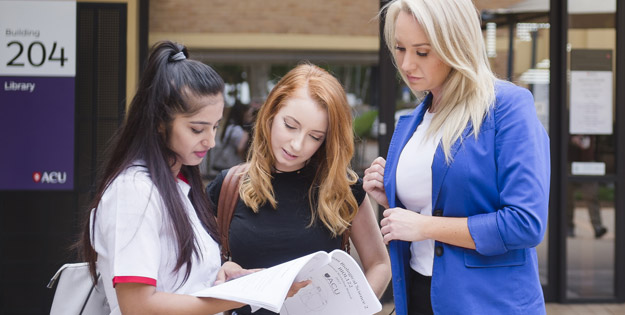Future student
Copyright@ Australian Catholic University 1998-2026 | ABN 15 050 192 660 CRICOS registered provider: 00004G | PRV12008
Copyright@ Australian Catholic University 1998-2026 | ABN 15 050 192 660 CRICOS registered provider: 00004G | PRV12008

In high school, students will hear the same questions again and again – will they go to university? What will they study? Where will they study? Here are some helpful tips to help your teen navigate their options and find the best fit for them.
A university degree not only opens up a huge range of career choices for your teen, it also opens their eyes to the world. They’ll connect with people from all over the city, country and globe – staff and students who share common interests.
But being asked to make decisions about your future study and career is a daunting task for anyone, let alone a teenager. That’s why we’ve put together some useful tips to help you guide your child on their journey to university.
Cut through the jargon
First thing’s first – the language used by universities can sometime be confusing, so we've put together a glossary of common university terms to make things a little simpler for you. Check in any time to find out the difference between phrases such as adjustment factors and admission pathways or graduand and graduate.
How to choose the right course
“What should I study?” is usually the biggest question for students. The good news is, it doesn’t need to be a stressful decision. For one thing, it is possible to change degrees part-way through if their initial choice doesn’t feel right. But to get off to the best possible start it’s important your teen focuses on a study area that interests them – such as media, sports, science or education. They are far more likely to enjoy and succeed at university if they’re studying their passion.
Start by looking at broad study areas. Undergraduate degrees often begin with more generalised topics, which means your child can wait until later in their degree to choose a specialisation.
How to choose the right university
You child may already know what they want to study, but narrowing down which university or campus to go to can be trickier.
There are many factors to consider when choosing a university, such as its reputation in a field, the calibre of the teaching staff and the facilities on offer.
It’s also important to consider how the campus will fit into your teen’s life. Are they happy to move for the right university? Would they prefer to commute from home? Is it close to shops, work, or their accommodation?

Then there is that undefined quality about a university – the vibe. How does it feel on campus?
Open days are a great way for you and your teen to see whether a university or particular campus is right for them. They’ll get a sense of the facilities on offer and have the opportunity to talk to staff and students about particular courses.
Another option is to book a tour of the campus. This will give you both a chance to see the campus ‘at work’.
If you can’t make it to the campus, see if you can explore the university virtually.
How to choose the right school subjects
Some degrees require applicants to have completed certain subjects at school. When looking at your teen’s preferred course, essential requirements should be clearly marked. For instance, a course may require a Year 12 equivalent of physics, biology or chemistry or a certain level of English. If you’re unsure you can ask for help.
Applying for university
Most undergraduate course applications are submitted through your state Tertiary Admissions Centre (TAC). Their websites will provide information and support for students applying. If your child would like to study interstate, they can apply on that state’s TAC website.
For ACT and NSW applications visit the Universities Admission Centre (UAC).
For Queensland applications visit the Queensland Tertiary Admission Centre (QTAC).
For Victoria applications visit the Victorian Tertiary Admission Centre (VTAC).
What if they don’t get the right ATAR?
Getting the right ATAR is only one way into university. Entry programs can help to boost a student’s selection rank by applying ‘adjustment factors’ to their ATAR. Typically students are eligible for adjustment factors because of:
financial hardship
home environment and responsibilities
personal illness and disability
education disruption
English language difficulties.
Another option is to apply for a pathway program. Students will study a certificate, diploma, or even a bachelor related to their preferred degree. On completion, they may be eligible for entry into the degree.
Some students may also like to consider early offer programs. That means they will receive an offer, with conditions, before ATARs are released. For example, we offer ACU Guarantee, which assesses a student for an early offer to ACU based on their Year 11 results. We also have entry programs for elite performers and athletes and an entry process for Aboriginal and Torres Strait Islander peoples.
Get ready for the next phase
When your child begins university, they’re taking their first big steps toward adulthood. Unlike high school, they’ll need to be responsible for their own education – making sure they attend classes, complete assignments on time and communicate with their lecturers and tutors. There won’t be teachers and school staff reminding them where they need to be and what they need to do. It’s a big change, but a fun one as they move into their next stage of life.
Ready to explore courses? See what ACU has to offer.
Copyright@ Australian Catholic University 1998-2026 | ABN 15 050 192 660 CRICOS registered provider: 00004G | PRV12008